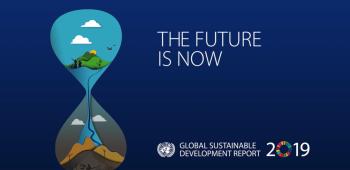Science
Description
The 2030 Agenda for Sustainable Development describes in paragraph 70 the composition and task of the Technology Facilitation Mechanism, established by the Addis Ababa Action Agenda and aimed at supporting the Sustainable Development Goals. More specifically, paragraph 70 of the 2030 Agenda reads: “the Technology Facilitation Mechanism will be based on a multi-stakeholder collaboration between Member States, civil society, private sector, scientific community, United Nations entities and other stakeholders and will be composed of: a United Nations Interagency Task Team on Science, Technology and Innovation for the SDGs, a collaborative Multistakeholder Forum on Science, Technology and Innovation for the SDGs and an on-line platform.”
Sustainable Development Goals Targets 17.6 and 17.8 respectively aim to “Enhance North-South, South-South and triangular regional and international cooperation on and access to science, technology and innovation and enhance knowledge sharing on mutually agreed terms, including through improved coordination among existing mechanisms, in particular at the United Nations level, and through a global technology facilitation mechanism“ and to “fully operationalize the technology bank and science, technology and innovation capacity-building mechanism for least developed countries by 2017 and enhance the use of enabling technology, in particular information and communications technology”.
Prior to the 2030 Agenda, the Rio+20 outcome document The Future We Want called for a Global Sustainable Development Report to bring together dispersed information and existing assessments, and to strengthen the science–policy interface at the High-level Political Forum on sustainable development (HLPF), through Paragraph 85.k.
As recalled by the Prototype Global Sustainable Report, published in 2014, the United Nations Secretary-General tasked, following Rio+20, the Division for Sustainable Development of the Department of Economic and Social Affairs to undertake “in-depth analysis and evaluation of trends and scientific analysis in the implementation of sustainable development, including lessons learned, best practices and new challenges, and cross-sectoral analysis of sustainable development issues”.
On that occasion, it was decided to produce a “prototype” report to facilitate dialogue between scientists and decision-makers and to establish for this purpose a United Nations system task team.
Decisions related to science were also taken by the World Summit on Sustainable Development held in 2002, by the Commission on Sustainable Development at its third (1995), fifth (1997) and sixth (1998) sessions and by the United Nations General Assembly at its Special Session to review the implementation of Agenda 21 (1997).
The Plan of Implementation adopted by WSSD underlined the importance of science-based decision-making, inter alia, by: integrating scientists' advice into decision-making bodies; partnerships between scientific, public and private institutions; improved collaboration between natural and social scientists, and establishing regular channels for requesting and receiving advice between scientists and policy makers; making greater use of integrated scientific assessments, risk assessments and interdisciplinary and intersectoral approaches; increasing the beneficial use of local and indigenous knowledge. Strengthening and creating centres for sustainable development in developing countries were encouraged, as well as networking with and between centres of scientific excellence and between science and education for sustainable development. Tools for science-based decision-making and sharing of knowledge and experiences to be promoted include: information and communication technologies, ground-based observations, satellite technologies, and national statistical services capable of providing sound data, assessment models, accurate databases and integrated information systems. The Plan also urged support for publicly funded research and development entities to engage in strategic alliances for the purpose of enhancing research and development.
The special session of the General Assembly held in June 1997 to review progress five years after UNCED stressed the need for authoritative scientific evidence for assessing environmental conditions and changes, which would facilitate international consensus-building. Scientific cooperation was to be promoted across disciplines for that purpose, and building scientific and technological capacity in developing countries was extremely important in that regard.
Science for sustainable development is the focus of Chapter 35 of Agenda 21. It calls for:
- strengthening the scientific basis for sustainable management;
- enhancing scientific understanding;
- improving long-term scientific assessment; and
- building up scientific capacity and capability.
Pagination
| Title | Category | Date |
|---|---|---|
| Ukraine | Thematic Session 5 | 6-May-2022 |
| Bolivia | Thematic Session 5 | 6-May-2022 |
| Uruguay | Thematic Session 5 | 6-May-2022 |
| Germany | Thematic Session 5 | 6-May-2022 |
| USA | Thematic Session 5 | 6-May-2022 |
| Group of Friends on Digital Technologies: Finland, Singapore and Mexico | Thematic Session 5 | 6-May-2022 |
| ETC group | Thematic Session 5 | 6-May-2022 |
| Mexico | Thematic Session 5 | 6-May-2022 |
| Russian Federation | Thematic Session 5 | 6-May-2022 |
| Tanzania | Thematic Session 5 | 6-May-2022 |
| Israel | Thematic Session 5 | 6-May-2022 |
| World Federation of Engineering Organizations | Thematic Session 4 | 6-May-2022 |
| Major Group: Children & Youth | Thematic Session 4 | 6-May-2022 |
| MyWorldMexico & Paradiplomacia | Thematic Session 3 | 9-May-2022 |
| Major Group: Children & Youth | Thematic Session 3 | 6-May-2022 |
Pagination
Milestones
-
January 2015 Targets 17.6 and 17.8Sustainable Development Goals Targets 17.6 and 17.8 respectively aim to “Enhance North-South, South-South and triangular regional and international cooperation on and access to science, technology and innovation and enhance knowledge sharing on mutually agreed terms, including through improved coordination among existing mechanisms, in particular at the United Nations level, and through a global technology facilitation mechanism“ and “fully operationalize the technology bank and science, technology and innovation capacity-building mechanism for least developed countries by 2017 and enhance the use of enabling technology, in particular information and communications technology”.
-
January 2015 Global SD Report - 1st EditionBuilding upon the 2014 Prototype report,the current Report responds to the Rio+20 mandate to contribute to strengthening the science-policy interface (SPI) for sustainable development, particularly in the context of the High-level political forum (HLPF).
-
January 2014 Global SD Report 2014 -Prototype EditionThe Prototype Global Sustainable Development Report defines a set of potential content, alternative approaches, and various ways of participation, in order to support Member States' deliberation on the scope and methodology of future editions of the Report. It maps sustainable development assessments and related processes and highlights emerging issues identified by scientists; assesses sustainable development progress; tells the “stories” of future pathways toward sustainable development based on the literature and discusses investment and technology needs; assesses various approaches to measuring sustainable development progress; identifies lessons learnt from national, regional and global case studies of the climate-land-energy-water-development nexus; presents illustrative science digests for decision-makers and summarizes various views of Member States and others on the process, methodology and scope of future reports.
-
January 2002 JPOI (Chap. 3 and 4)The Plan of Implementation adopted by WSSD underlined the importance of science-based decision-making, inter alia, by: integrating scientists' advice into decision-making bodies; partnerships between scientific, public and private institutions; improved collaboration between natural and social scientists, and establishing regular channels for requesting and receiving advice between scientists and policy makers; making greater use of integrated scientific assessments, risk assessments and interdisciplinary and intersectoral approaches; increasing the beneficial use of local and indigenous knowledge.
-
January 1998 CSD-6 (Chap 1B- Decision 6/3)Decisions related to science were adopted by the Commission on Sustainable Development at its sixth session in 1998. As determined at UNGASS, the economic, sectoral and cross-sectoral themes considered were industry, strategic approaches to freshwater management, and technology transfer, capacity building, education, science and awareness raising.
-
January 1997 GA 19th Special Session. ScienceDecisions related to science were taken by United Nations General Assembly at its Special Session to review the implementation of Agenda 21. The GA Special Session convened to review and assess progress undergone on Agenda 21. With Resolution A/RES/S-19/2, delegates agreed on the adoption of the Programme for the Further Implementation of Agenda 21.
-
January 1997 CSD-5: ScienceCSD-5 was held in 1997 and began negotiating the UNGASS outcome. The Report of the Secretary General "Science for sustainable development" was among the documents before the Commission at its fifth session.
-
January 1995 CSD-3 (Chap. 1C and Chap. 5)In 1995, the Commission in its third session took note of the report of the Secretary-General on science for sustainable development (E/CN.17/1995/16), including the initiatives taken by national Governments, the United Nations system, other international organizations, major groups and the scientific and technological community to implement science-related policies and programmes. The Commission also welcomed the proposals for action contained in section III, which identified areas for priority actions that should be taken by countries and regional and international organizations, with a view to further enhancing the contribution of science to sustainable development, in particular in developing countries.
-
January 1992 Agenda 21 (Chap. 35)"As main outcome of the UN Earth Summit held in Rio in 1992, Agenda 21 calls for a global partnership able to address the problems of the present and prepare the International Community for the challenges of the upcoming century." Chapter 35 of Agenda 21 is devoted to science for sustainable development and calls for: strengthening the scientific basis for sustainable management; enhancing scientific understanding; improving long-term scientific assessment and building up scientific capacity and capability.



